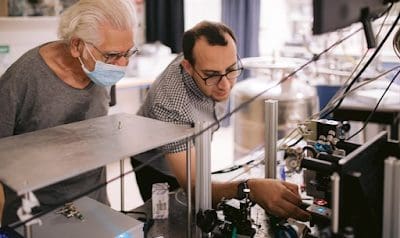Quantum computers will revolutionize our computing lives.
For some critical tasks they will be mind-bogglingly faster and use much less electricity than today’s computers.
But, and here’s the bad news, these computers will be able to crack most of the encryption codes currently used to protect our data, leaving our bank and security information vulnerable to attacks.
Currently, most computer security relies on mathematical manipulations that, at present, ensure a very high level of security—it would take a regular computer billions of years to break one of those codes.
However, in our quantum future, new methods of encryption that rely on the laws of physics, rather than mathematical equations, will need to be developed.
One fruitful approach is to use the quantum properties of single photons (particles of light) to securely encrypt a message so that any attempt to hack it is immediately detectable by both the sender and recipient. However, getting a suitable source of single photons has been an immense challenge.
Now, a team of researchers, led by Professor Ronen Rapaport and Dr. Hamza Abudayyeh of the Racah Institute of Physics at the Hebrew University of Jerusalem (HU), together with Professor Monika Fleischer, Annika Mildner and others at the University of Tübingen in Germany, has achieved a significant breakthrough. Their findings bring us closer to a simple and efficient method of quantum encryption, and were published in the recent edition of ACS Nano. READ MORE
Israeli researchers reach breakthrough in quantum encryption https://amos37.com/israeli-researchers-reach-breakthrough-in-quantum-encryption/
| Josh Toupos |



















